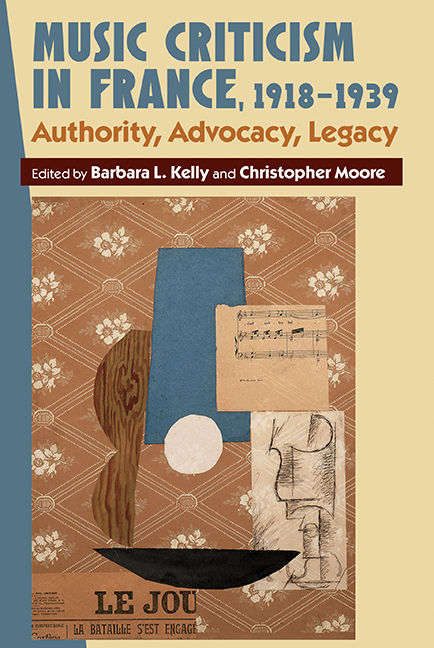Book contents
- Frontmatter
- Contents
- List of Figures
- List of Tables
- List of Contributors
- Acknowledgements
- Introduction: The Role of Criticism in Interwar Musical Culture
- 1 Music Criticism and Aesthetics During the Interwar Period: Fewer Crimes and More Punishments
- 2 Nostalgia and Violence in the Music Criticism of L'Action française
- 3 Charles Koechlin: The Figure of the Expert
- 4 Bleu-horizon Politics and Music for Radio Listeners: L'Initiation à la musique (1935)
- 5 Common Canon, Conflicting Ideologies: Music Criticism in Performance in Interwar France
- 6 Arthur Honegger: Music Critic for Musique et Théâtre (1925–1926)
- 7 A Woman's Critical Voice: Nadia Boulanger and Le Monde musical, 1919–1923
- 8 From a Foreign Correspondent: The Parisian Chronicles of Alejo Carpentier
- 9 Debussy's ‘Reputational Entrepreneurs’: Vuillermoz, Koechlin, Laloy and Vallas
- 10 The Legacy of War: Conceptualising Wartime Musical Life in the Post-War Musical Press, 1919–1920
- 11 Satie, Relâche and the Critics: Controversies and Legacy
- 12 Creating a Canon: émile Vuillermoz's Musiques d'aujourd'hui and French Musical Modernity
- Selected Bibliography
- Index
Introduction: The Role of Criticism in Interwar Musical Culture
Published online by Cambridge University Press: 17 July 2019
- Frontmatter
- Contents
- List of Figures
- List of Tables
- List of Contributors
- Acknowledgements
- Introduction: The Role of Criticism in Interwar Musical Culture
- 1 Music Criticism and Aesthetics During the Interwar Period: Fewer Crimes and More Punishments
- 2 Nostalgia and Violence in the Music Criticism of L'Action française
- 3 Charles Koechlin: The Figure of the Expert
- 4 Bleu-horizon Politics and Music for Radio Listeners: L'Initiation à la musique (1935)
- 5 Common Canon, Conflicting Ideologies: Music Criticism in Performance in Interwar France
- 6 Arthur Honegger: Music Critic for Musique et Théâtre (1925–1926)
- 7 A Woman's Critical Voice: Nadia Boulanger and Le Monde musical, 1919–1923
- 8 From a Foreign Correspondent: The Parisian Chronicles of Alejo Carpentier
- 9 Debussy's ‘Reputational Entrepreneurs’: Vuillermoz, Koechlin, Laloy and Vallas
- 10 The Legacy of War: Conceptualising Wartime Musical Life in the Post-War Musical Press, 1919–1920
- 11 Satie, Relâche and the Critics: Controversies and Legacy
- 12 Creating a Canon: émile Vuillermoz's Musiques d'aujourd'hui and French Musical Modernity
- Selected Bibliography
- Index
Summary
Music Criticism in France, 1918–1939: Authority, Advocacy, Legacy examines the aesthetic battles, discursive strategies and cultural stakes that animated and informed French music criticism during the interwar period. Drawing on a rich corpus of critical writings and archival documents, the primary goal of its twelve essays is to uncover some of the public debates that emerged around classical music at this time. As such, it provides significant new insights into the period's musical priorities and values while also highlighting some of the challenges confronting this war-bound generation. The book examines the ways in which influential critics played prominent roles in promoting the careers and defending the reputations of both young and established composers. It considers the efforts that critics took to shape the history of France's musical past. Finally, it questions how critics used their professional and social affiliations as a means of better buttressing their own aesthetic and political agendas.
The interwar period in France is often described as problematic, more famous for the deaths of major figures including Claude Debussy, Gabriel Fauré and Camille Saint-Saëns than the achievements of its living composers. Until fairly recently it has been marginalised, in contrast to the ‘golden’ generation of Debussy and his circle on the one hand and the ‘renewal’ of French musical life with Olivier Messiaen on the other. Yet the ‘Années Folles’ are distinctive in several respects. Having inherited the pre-war musical aesthetics of Debussy and Fauré, but also confronted with the iconoclastic works of a new generation (including Les Six) who used the press to reject the aesthetics of its forebears, interwar French music critics were drawn into an acute battle over conservative and progressive musical trends. Whereas critics including Henri Collet (1885–1951), Paul Landormy (1869–1943) and Henry Prunières (1886–1942) energetically supported the works and aesthetic paradigms of the younger generations, figures such as Émile Vuillermoz (1878–1960), Léon Vallas (1879–1956), Dominique Sordet (1889–1946) and Lucien Rebatet (1903–72) frequently denounced the avant-garde and attempted to influence a musical climate for which they felt a fair measure of dissatisfaction. As a result, the period is characterised by often fraught debates around what it meant to be avant-garde and modern.
- Type
- Chapter
- Information
- Music Criticism in France, 1918–1939Authority, Advocacy, Legacy, pp. 1 - 16Publisher: Boydell & BrewerPrint publication year: 2018

